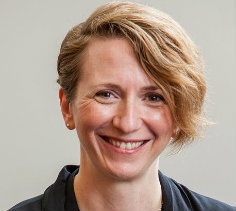Kristen Cardinal
- Programme: LBS Sloan Masters in Leadership and Strategy
- Nationality: American
- Job Pre-programme: Global Medical Science Liaison Manager, Actelion
- Job Post-programme: Director of Global Development, RIKEN Brain Science Institute
Reassessing directions
I came to the Sloan programme wanting to reassess where I might go next. Although I wasn’t actively looking for a particular leadership role, I was keen to learn more about strategic decision-making, and I needed to bite the bullet when it came to finance and accounting. The full-time aspect of the programme appealed to me – I was ready to devote myself totally to learning, and didn’t want to squeeze my studies in around my working life.
Learning from challenges
Probably my biggest challenge was being assigned to work in small groups, with no clear hierarchy, no leader and no rigid structure. Learning to listen to and understand others in a flat team – to identify your own strengths and weaknesses and comfort zones, in order to move forward as a group – was very exciting. Ironically, one of my most memorable learning was a moment of apparent failure. It was one of our first projects, a kind of puzzle during which we worked in small groups to put together a number of events in the sequence that we thought would lead to the best outcome. It was a difficult task which we had to complete in an extremely short timeframe. After going round and round in circles, my team couldn’t reach consensus. Eventually we thought we’d simply give in and admit we just hadn’t come up with an answer. The professor, however, made it clear that wasn’t an option! So we threw something together, and of course our score was very low. We then reassessed how we had failed and what we could we have done differently – and ended up becoming a very high functioning team.
An inspiring week
My International Assignment, in Shanghai, was exceptional. I’d never been to China, and was amazed by the access we were given. We visited a shipping port owned by Maersk, a manmade island made of shipping containers. Just realising the scale of what is achievable was an inspiration. We were offered a number of topics and then assigned teams to work with in that area – I chose to work on corporate reporting, exploring how companies share their financial information and strategic plans, and how the governance is structured and managed. How transparent is that information? How accurate and easy is it to access? How are important decisions made within the company? As a team, we had to contact companies in Shanghai and interview them about these topics, working to create a report and presentation to our class back in London. This not only taught me a huge amount about how business was conducted in another country – in this case China – but also how to find out the information we needed from the right people. This task was a real boost to my networking skills.
Key credentials
Sloan played a large part in me getting my current role. When my husband was offered a position in Japan, we were unsure whether I would be able to find a job here – statistically Japan has very few women in senior management compared with other industrialised countries. However, the director of my institute, who is pushing for more diversity within the organisation, offered to circulate my CV among his pharmaceutical contacts. Soon after I sent it to him, he called saying he’d like to be the first to offer me a job – and much of that was on the basis of my LBS credentials.
Building strategic frameworks
My role is fairly fluid – I have a lot of scope to make plans and suggestions – and I feel far more comfortable managing that than I would have once done. My confidence in being able to present plans to senior directors and decision makers is definitely down to the Sloan, and I’ve applied many of the strategic frameworks that I learned, from simple five forces analysis to how to manage a portfolio. The core principles hold true – you can use the same tools and thinking to evaluate potential partnerships, for example, whether you’re a science institute or a financial institution.
Growing through self awareness
I gained so much from the Biography module. One of the highlights was creating a personal timeline, where we drew on a long piece of paper how happy or unhappy we felt throughout our lives. We then added major life events to the line, which allowed us to see the relationship between how we felt at a given time and the choices we subsequently made in our lives. We were also assigned to teams throughout the module and regularly had to share some fairly deep thoughts and feelings with them. Needless to say it was very personal, but it helped tremendously in improving my self-awareness. Ultimately it was a gift to be able to take time out to focus on our own experience, to explore our drivers and our ambitions. And the more I learned about myself, the more confident I became in my leadership potential. Sloan taught me that there is no “perfect leader” and that having a flexible, adaptive approach is essential. It’s about knowing your own limitations and building the best team around you, so everyone complements each other. In many ways, Sloan’s emphasis on self-awareness was the most valuable learning I brought back.
Kristen Cardinal was a recipient of the Sloan LBS Sloan Women's Scholarship (LBS Fund)
"It was a gift to be able to take time out to focus on our own experience, to explore our drivers and our ambitions."

